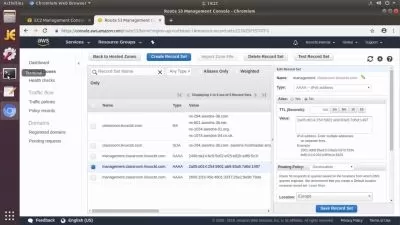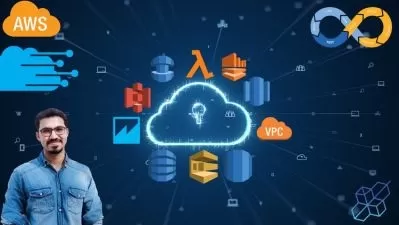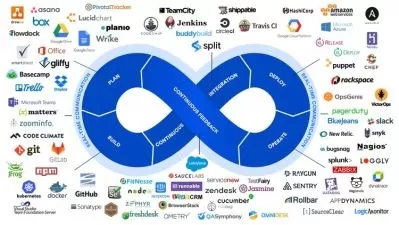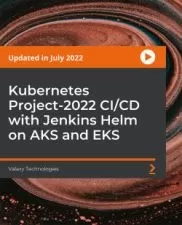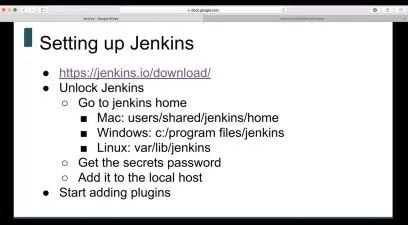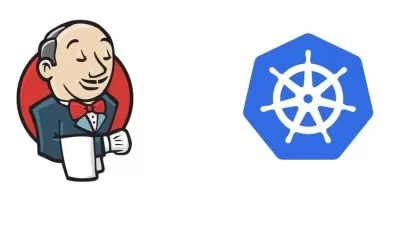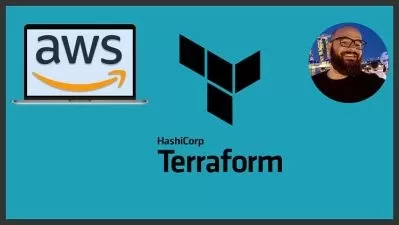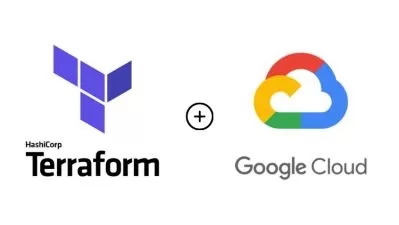The Ultimate DevOps Course 2023 - Jenkins, Terraform, AWS
Norma Ochoa
9:02:36
Description
Speak confidently about DevOps CICD from your own personal experience implementing the pipelines in this course.
What You'll Learn?
- Successfully pass your DevOps interviews, even if you do not have an official DevOps certification
- Speak confidently about DevOps CICD Pipelines Implementation on AWS from your own personal experience implementing the pipelines in this course.
- Get promoted to DevOps leadership positions so that you can advance in your career
- After successfully completing this course, you will be able to understand, explain and implement DevOps Pipelines.
- Understand the core concepts of Architecting DevOps Pipelines for Specific Goals
- Learn how to manage source code, build scripts, and application configuration required to build, deploy, test, and release applications.
- Learn how to build a DevOps Pipeline that automatically builds, packages and tests a spring boot application from scratch
- Learn how to integrate DevOps tools such as: Jenkins, Packer, Maven, GitHub, JMeter & Terraform in AWS.
- Learn how to create your DevOps Infrastructure and Pipelines using your own GitHub and AWS Accounts.
- Learn how to build and run automated tests against every completed build to ensure the software is always in a working state.
- Learn how to automatically provision infrastructure as code with Terraform as part of your DevOps Pipelines
- Learn how to build a complete and decouple DevOps Lifecycle Pipeline that includes five independent and decoupled jobs
- Present yourself with confidence in the project meetings and DevOps Jobs Interviews
- Learn how to use JMeter to automatically test your applications as part of your DevOps Pipelines
- Learn how to create highly complex Jenkins CICD pipelines
- Learn how to build AWS AMI Images with Packer
- Learn how DevOps applies to the Software Development Life Cycle
- Learn how to extend your DevOps Pipelines architecture both horizontally and vertically
Who is this for?
What You Need to Know?
More details
DescriptionCourse material last updated:Â March 2023
Speak confidently about DevOps CICD Pipelines Implementation on AWS from your own personal experience implementing the pipelines in this course.
This is a project-based DevOps Course, meaning that at the end of the course, you will have a complete DevOps Pipeline and DevOps Infrastructure that will automatically build, package, and test the Java Spring Boot Application - PetClinic. You will build this DevOps Pipeline and Infrastructure from scratch. The DevOps pipeline is composed of 5 separate, independent, and decoupled jobs, each stored on their own git repository. The five jobs are the following: the build job, the packaging job, the manual/exploratory testing job, the API testing job, and the performance testing job.
DevOps CICD is a software engineering approach to automate the delivery of software. It aims to build, test, and release software faster and more frequently. The approach helps reduce the cost, time, and risk of delivering changes by allowing for more incremental updates to applications in production.
In this course, you will learn techniques, processes, and tools to achieve continuous delivery by connecting and automating all phases of software delivery, including configuration management, automated acceptance testing, dependency management, and the creation and management of testing environments. These techniques are widely applicable to all sorts of different software projects—big, small, highly technical, or short sprints to early value.
Using a practical approach, the course covers the CICD tools, strategies, and concepts of Continuous Delivery. You will create your own Jenkins Pipeline to build, test and deploy jobs as well as integrate Jenkins with integration and delivering tools such as Maven, JUnit, GitHub, JMeter, Packer, and Terraform on AWS.
What Past Students Are Saying
The best part of the class is the various aspects of DevOps and the CI/CD pipeline. I learned a lot. Thank you!
-Kuowen
Just an outstanding instructor. Keenly knowledgeable in a cutting-edge field, yet available for consultation and approachable across the range of coding experience amongst a wide range of experience in the student group. The course is exceedingly well-organized, and gives great "bang-for the buck".
- Rafa
This class was fantastic for me! It helped to fill in gaps in my experience - I was familiar with some of the tools and practices, but not all, and putting together the final project facilitated my understanding of the mechanisms of a working CI/CD pipeline.
-Todd
I really liked that the course focused on the hands-on learning (labs) evenly with the theoretical. For this topic especially, the hands-on learning is critical and is something that is missing in other courses.
- Rick
I liked this course on DevOps, because at work, we are in the process of establishing a DevSecOps and going through this course gave me hands-on experience, and I appreciate that very much.
- Derick
Norma is an expert in the field of DevOps. She has a pleasant personality also. Whenever we encountered any problems, she would try to address it.
- Jacob
I really liked the approach the instructor took to help and assist my learning and development throughout the course. The instructor was very friendly and approachable. She has immense amount of knowledge and experience in DevOps and it shows. I will keep in touch with her for further coursework for myself as well as my team. I appreciate her hardwork and great attitude!
- Alex
Prerequisites: Knowledge of AWS Environment is desirable but not required. Students should have knowledge of basic System Integration and Test methods, tools, and terms.
Software:
AWS account
PDF Reader / Google Word Access
Open-source software (download links will be provided)
Hardware:
A personal computer terminal
Instructor Teaching & Software Experience:
648 - Number of students taught using this course material in a Virtual Instructor Led Training (VILT) course
5+ Years Teaching at Private Technical Companies and UCSD University
25+ Years of working in the Software Industry
Instructor Education & AWS Certifications
BS in Computer Science (SDSU)
AWS Architecture Certification
AWS Developer Certification
AWS System Integration Certification
AWS DevOps Professional Certification
Who this course is for:
- Program Managers that want to understand how DevOps should be implemented.
- Software Engineers that want to step by step instructions and videos on how to implement DevOps Pipelines
- QA Engineers
- Aspirants to shift career to DevOps
- Architects
- Technical Leads
- Anyone that wants to learn Core Strategies of Continuous Integration / Continuous Delivery
Course material last updated:Â March 2023
Speak confidently about DevOps CICD Pipelines Implementation on AWS from your own personal experience implementing the pipelines in this course.
This is a project-based DevOps Course, meaning that at the end of the course, you will have a complete DevOps Pipeline and DevOps Infrastructure that will automatically build, package, and test the Java Spring Boot Application - PetClinic. You will build this DevOps Pipeline and Infrastructure from scratch. The DevOps pipeline is composed of 5 separate, independent, and decoupled jobs, each stored on their own git repository. The five jobs are the following: the build job, the packaging job, the manual/exploratory testing job, the API testing job, and the performance testing job.
DevOps CICD is a software engineering approach to automate the delivery of software. It aims to build, test, and release software faster and more frequently. The approach helps reduce the cost, time, and risk of delivering changes by allowing for more incremental updates to applications in production.
In this course, you will learn techniques, processes, and tools to achieve continuous delivery by connecting and automating all phases of software delivery, including configuration management, automated acceptance testing, dependency management, and the creation and management of testing environments. These techniques are widely applicable to all sorts of different software projects—big, small, highly technical, or short sprints to early value.
Using a practical approach, the course covers the CICD tools, strategies, and concepts of Continuous Delivery. You will create your own Jenkins Pipeline to build, test and deploy jobs as well as integrate Jenkins with integration and delivering tools such as Maven, JUnit, GitHub, JMeter, Packer, and Terraform on AWS.
What Past Students Are Saying
The best part of the class is the various aspects of DevOps and the CI/CD pipeline. I learned a lot. Thank you!
-Kuowen
Just an outstanding instructor. Keenly knowledgeable in a cutting-edge field, yet available for consultation and approachable across the range of coding experience amongst a wide range of experience in the student group. The course is exceedingly well-organized, and gives great "bang-for the buck".
- Rafa
This class was fantastic for me! It helped to fill in gaps in my experience - I was familiar with some of the tools and practices, but not all, and putting together the final project facilitated my understanding of the mechanisms of a working CI/CD pipeline.
-Todd
I really liked that the course focused on the hands-on learning (labs) evenly with the theoretical. For this topic especially, the hands-on learning is critical and is something that is missing in other courses.
- Rick
I liked this course on DevOps, because at work, we are in the process of establishing a DevSecOps and going through this course gave me hands-on experience, and I appreciate that very much.
- Derick
Norma is an expert in the field of DevOps. She has a pleasant personality also. Whenever we encountered any problems, she would try to address it.
- Jacob
I really liked the approach the instructor took to help and assist my learning and development throughout the course. The instructor was very friendly and approachable. She has immense amount of knowledge and experience in DevOps and it shows. I will keep in touch with her for further coursework for myself as well as my team. I appreciate her hardwork and great attitude!
- Alex
Prerequisites: Knowledge of AWS Environment is desirable but not required. Students should have knowledge of basic System Integration and Test methods, tools, and terms.
Software:
AWS account
PDF Reader / Google Word Access
Open-source software (download links will be provided)
Hardware:
A personal computer terminal
Instructor Teaching & Software Experience:
648 - Number of students taught using this course material in a Virtual Instructor Led Training (VILT) course
5+ Years Teaching at Private Technical Companies and UCSD University
25+ Years of working in the Software Industry
Instructor Education & AWS Certifications
BS in Computer Science (SDSU)
AWS Architecture Certification
AWS Developer Certification
AWS System Integration Certification
AWS DevOps Professional Certification
Who this course is for:
- Program Managers that want to understand how DevOps should be implemented.
- Software Engineers that want to step by step instructions and videos on how to implement DevOps Pipelines
- QA Engineers
- Aspirants to shift career to DevOps
- Architects
- Technical Leads
- Anyone that wants to learn Core Strategies of Continuous Integration / Continuous Delivery
User Reviews
Rating
Norma Ochoa
Instructor's Courses
Udemy
View courses Udemy- language english
- Training sessions 75
- duration 9:02:36
- Release Date 2023/09/13






![Ultimate AWS Certified Security Specialty [NEW 2025] SCS-C02](https://traininghub.ir/image/course_pic/43483-x225.webp)

